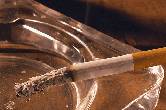 A service of the U.S. National Library of Medicine
A service of the U.S. National Library of Medicine  National Institutes of Health
National Institutes of Health

Secondhand Smoke in Pregnancy Seems to Harm Baby, Too

WEDNESDAY, Sept. 19 (HealthDay News) -- Expectant mothers are often told they shouldn't smoke, but a new study reports that even secondhand smoke has a negative effect on the brain development of newborns.
Pregnant women who smoke or inhale secondhand smoke put their children at risk for learning difficulties, attention-deficit/hyperactivity disorder and obesity, the researchers from Spain said. The investigators also found that babies who have been exposed to nicotine have impaired physiological, sensory, motor and attention responses in the first two to three days of life.
For the study, scientists from the Behaviour Evaluation and Measurement Research Center of the Rovira i Virgili University examined 282 healthy babies 48 to 72 hours after they were born to assess their behavior and responses.
Of the mothers involved in the study, 22 percent smoked during their pregnancy and nearly 6 percent were exposed to secondhand smoke. Among those who smoked, 12.4 percent had no more than five cigarettes per day, 6.7 percent had between six and 10 cigarettes daily and 2.8 percent smoked 10 to 15 cigarettes, the investigators found.
The study findings indicated that the babies born to women who smoked or were exposed to secondhand smoke were less able to block stimuli that could alter their central nervous system.
The research also revealed that babies of women who inhaled secondhand smoke had poor motor development. In addition, the newborns of mothers who smoked during pregnancy were less able to regulate their physiological, sensory, motor and attention responses.
"Newborns who have had intrauterine exposure to nicotine, whether in an active or passive way, show signs of being more affected in terms of their neurobehavioral development," stated the study's lead author, Josefa Canals Sans, in a Spanish Foundation for Science and Technology news release.
The study authors specifically advised that women should be warned about the effects of secondhand smoke on fetus and infant development.
The study was published recently in Early Human Development.
While the study found an association between maternal smoke exposure and infant brain development, it did not prove a cause-and-effect relationship.
SOURCE: Spanish Foundation for Science and Technology, news release, Sept. 14, 2012
- More Health News on:
- Infant and Newborn Development
- Pregnancy
- Secondhand Smoke